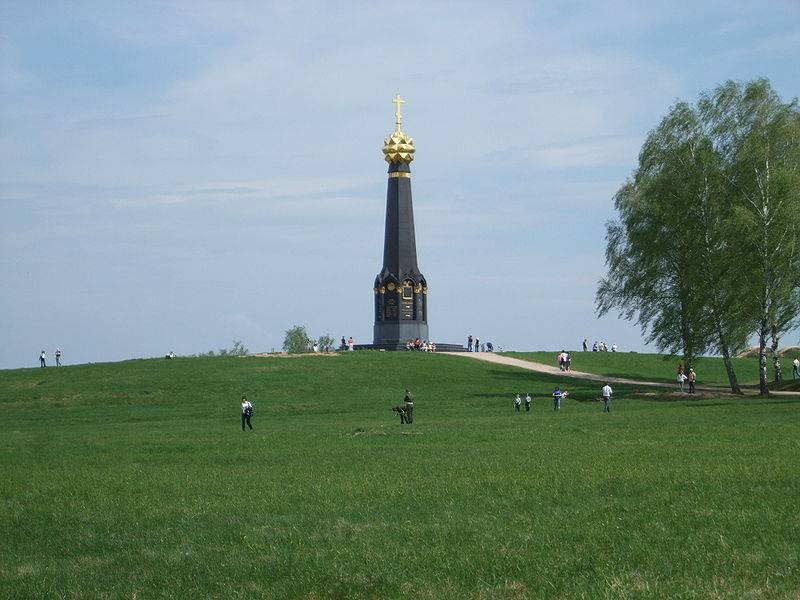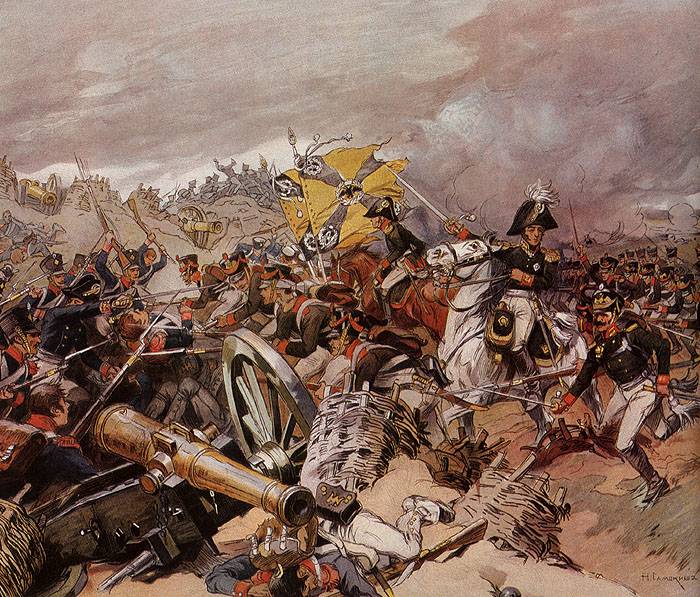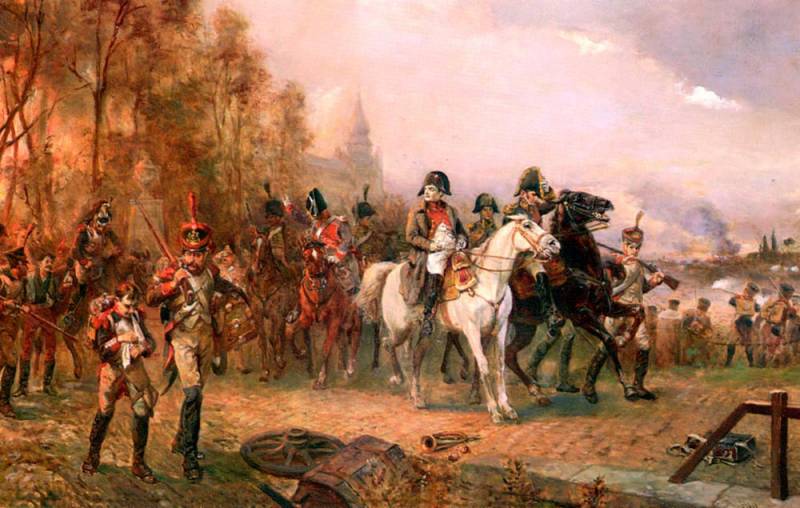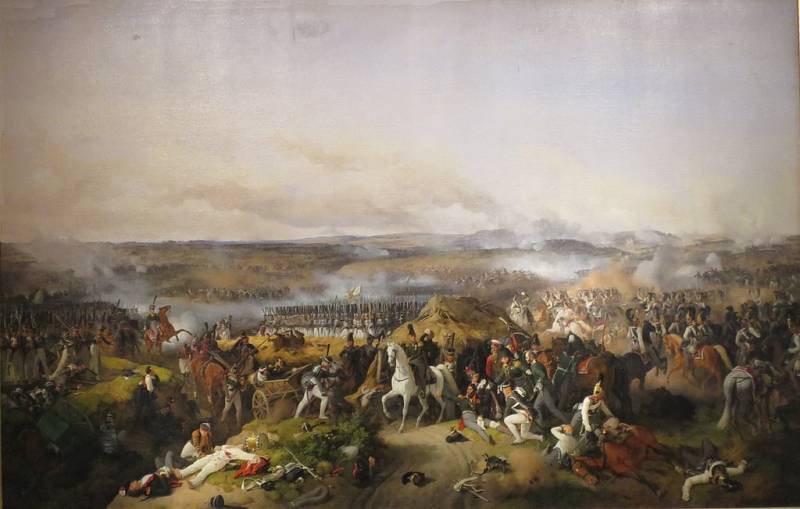Battle of the Moskva River
Side forces and position
On September 4 (new style), 1812, Kutuzov wrote in a report to Emperor Alexander:
But not everyone considered the location "successful". For example, the eminent commander Barclay de Tolly believed that "It was profitable in the center and on the right flank, but the left wing in a straight line with the center was completely unsupported." Bennigsen evaluated her as follows: "This was the greatest mistake that could have been made by acting against Napoleon, whose system is known and against which, therefore, measures can be taken, as I showed in the war of 1806-1807." Napoleon and Clausewitz also considered the position of the Russians extremely weak.
The Borodino position included two roads: Novaya Smolenskaya, which passed through the village of Borodino, and Staraya Smolenskaya, which passed through the village of Utitsa. The left flank of the Russian position rested against an extremely dense forest. The right flank was covered by the Maslovsky forest.
To create strongholds, the heights of the villages of Semenovskoye and Shevardino, as well as the Utitsky Kurgan, were used. The Borodino position was quite crossed, which made it possible to hide part of its troops from the enemy and at the same time did not allow the enemy to make wide maneuvers.
On September 5 and 7, engineering preparation for the battle was carried out. In this short period of time, it was possible to erect the Maslovsky fortification, three batteries at Gorka, the Kurgan battery and make a trench for the rangers. After engineering work, Kutuzov set about organizing the rear. On September 4, Kutuzov ordered Rostopchin to accept "All possible measures for the earliest possible procurement of 1000 carts for each station from Moscow to Mozhaisk. Without these allowances, hostilities can be stopped with the greatest harm."... Soon Kutuzov ordered Rostopchin to ensure the organization of mobile stores for the troops.
On August 29, 1812, Kutuzov reported to the Tsar that there were 89.562 soldiers in the army and 10.891 non-commissioned and chief officers with 605 guns. Soon, reinforcements arrived at Kutuzov in the form of 15.000 people under the command of Miloradovich. The Russian army also numbered 7 thousand warriors of Smolensk and 20 thousand warriors of the Moscow militia. Of the militias, only 10 thousand were in the system, and the rest were distributed to the rear. On the day of the Borodino battle, the number of guns increased to 640. Based on all this, the size of the Russian army in the Battle of Borodino can be estimated at 126 thousand people with 640 guns.
Kutuzov and his staff thought that Napoleon had about 180 thousand men and 1 thousand guns with him. Bagration thought that the number of French troops was about 140 thousand people.
On September 2-3, Napoleon ordered a roll call, so that we know a fairly accurate number of French troops: 135 thousand people with 587 guns. Napoleon, not having accurate information about the size of the Russian army, thought that it was about 130 thousand people.

Shevardino fight
Kutuzov simply needed to complete engineering and other preparatory work, so the commander-in-chief decided to detain the French at the village of Shevardino. Württemberg officer Fleischmann recalls:
Before the battle (September 5), Kutuzov told the soldiers:
Such emotional sayings of Kutuzov had a very favorable effect on the soldiers and inspired them.
Meanwhile, Poniatovsky's corps was walking along the Old Smolensk road, the I, III and IV infantry corps and the guard were moving in the center. On the left flank was Pear's cavalry and Prince Eugene's corps.
Kutuzov gave the order to withdraw the troops of the left flank to the village of Utice. The departing troops were supposed to defend the Shevardinsky redoubt. In total, there were 12 thousand people with 36 guns. The commander was Gorchakov.
Murat went on the attack, but the huntsmen opened powerful fire on the enemy. The Jaegers made it extremely difficult for Napoleon to deploy his forces. He moved 30 thousand men with 186 guns to capture the redoubt. Prince Poniatovsky began a new attack, pushing back Karpov's detachment. Soon Davout took the village of Fomkina, and Compan opened artillery fire on the redoubt.
Attempts by Prince Poniatowski to bypass the redoubt from the south failed. The prince was hindered by Russian artillery to make a detour, so he led his troops to attack the rangers. The Jaegers fought bravely, but they had to retreat under the onslaught of the superior forces of the enemy. Soon, the French, reinforced by the divisions of Moran and Friant from the Davout corps, finally took the redoubt and the village of Chevardino. Napoleon in Bulletin 18 says:
The Russian command launched a counteroffensive, crushing two columns of the French with infantry and cavalry and capturing the heights at Doronin. Soon, at 21:00, the former owners again had the redoubt, and at 23:XNUMX the Russian troops began to withdraw.
After the battle, the troops lit fires and began to eat. The night passed quietly.

Battle of Borodino
On the morning of September 6, Kutuzov drove around his positions. He also ordered to bring an icon of the Smolensk Mother of God. Soldiers and officers ran to the icon to pray. It is noteworthy that many soldiers and officers, in anticipation of tomorrow's battle, prepared for death, not taking a portion of wine and thinking about their lives. The day passed relatively calmly, with only the left flank being fired. Everyone was preparing for tomorrow's battle.
Meanwhile, in the morning Napoleon also drove around his positions, examining in detail his center and left flank. Then he went to the right flank, where the Poniatovsky corps was located. Napoleon gave his soldiers a rest that day. Napoleon wanted to strike on the left flank of the Russians, and then to the center.
Kutuzov was also engaged in strengthening the defense. He gave the order to strengthen the Maslovsky and Semyonovsky flushes. Soon Kutuzov voiced the disposition that determined the course of the battle. The army was in fact divided into four groups that could interact and act independently.
Kutuzov put emphasis on the preservation of the New Smolensk road. On September 5, he wrote:
On September 7, at 5 o'clock in the morning, the French attacked a detachment occupying the village of Borodino, which they soon took. Having captured the village, Prince Eugene stopped the offensive. The Viceroy was supposed to attack the center after the Semyonovski flushes were successful.
On the left flank, Poniatovsky's corps went around the enemy's left flank. Napoleon ordered him to hurry, but the prince went to the village of Utice at eight in the morning.
The battles for Semyonovskie flashes began after five o'clock in the morning with artillery shelling. Dreiling recalls: “The roar of a thousand guns, rifle fire - all this merged into one continuous hum; the hum is no longer audible; there comes a state that cannot be described, as if you really do not feel anything; there is a doubt: are you alive? "... Soon the flushes began to change hands, but the French still managed to take the flushes.
At 10 o'clock in the morning, Kutuzov ordered Platov and Uvarov to sabotage the French left flank. Napoleon was forced to send 30 thousand people to his left flank. Kutuzov made Napoleon lose two of the most precious hours, and at 15 o'clock Kutuzov ordered the cavalry to return to their original position.
Friant's division captured the village of Semenovskaya. In the middle of the day, Napoleon launched a powerful attack on Rayevsky's batteries. 70 French guns fired flanking, and 60 guns fired at the battery from the front. The batteries have been taken.
After 16 pm and until nightfall, skirmishes and artillery fire continued. At midnight Kutuzov ordered to withdraw for Mozhaisk.
Hack and predictor Aviator
Despite the fact that Kutuzov announced his victory, the battle cannot be called a clear success of the Russian troops, since all the fortifications were taken by the French. But it cannot be said that the French won the battle. In the battle, Napoleon suffered heavy losses while the Russian army retreated in perfect order. As a result, Napoleon received a devastated Moscow, which was a burden and an unnecessary trophy for him. So we can say that Napoleon won a tactical victory, and Kutuzov won a strategic one.
List of used literature:
1. Bloodless L.G. The entire Patriotic War of 1812: full presentation. Moscow: Algorithm, 2017 p.
2. Malyshkin S.A. Chronology of events of the Battle of Borodino.
3. Colencourt, Armand de. Napoleon through the eyes of a diplomat and a general. Moscow: AST, 2016 p.
4. Anufriev V.P. Chronology of the Shevardinsky battle.


Information